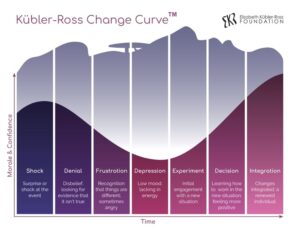Blog
Stages of Grief – Losing Someone
- February 11, 2021
- Posted by: Healthy Young NV
- Category: Mental Health Teen Tween Young Adult

The Aftermath of a Vehicular Fatality: Picking up the Pieces
It was November 19th, 2018. The leaves were changing, the temperatures were getting cooler, and I was finishing up midterms. Thanksgiving Break was in just a few days, and I was looking forward to Turkey Day with my family and friends. As I was getting ready to go to school, my mom called. “Kayla, there’s a crash on the freeway. The coroner just got here.” I didn’t know it then, but those words would eventually rock me to my core. My childhood friend died in that accident. It’s been two years since her death, and I miss her every day.
Following the accident, I deeply struggled with Elizabeth Kubler Ross’s five stages of grief. I thought they were supposed to be linear, though they certainly weren’t for me. I deeply wanted to be “normal,” I wanted her to be alive with me, and I wanted to just forget about her death and act like it never happened. For the next year and a half after her death, I struggled with profound depression, anger, and self-isolation.
I first want to say that if you lost someone due to death, I am so sorry. Friend, my heart breaks for you. I’m reaching through this screen and wrapping you in a big bear hug. I also want to extend a huge thank you if you walked with a friend or family member through grief after death. You helped them more than you realize. Today, I’m writing to you as a woman who has experienced earth-shattering depression and ramifications of grief in literally every area of my life. I want to tell you what I know now that I wish I knew then, hoping that this will help you too.
1. I gave myself the time, space, and grace to grieve. For a year following her death, I suppressed the grief and isolated myself from my friends and family. I paid for that greatly. Once I allowed myself to cry and sit in the grief, explore all the emotions, memories, and feelings that came up, I began to heal. I have to be honest here: I still struggle with this. There are some days when I would rather stuff the grief. However, I know now that it is far more detrimental to stuff than to experience it.
2. I remembered the good memories I shared with her and was careful to not ruminate over her death. For a few months after my friend’s death, I wondered about the nature of the accident and if she suffered. This was wildly damaging to my heart. If I focused on the physical nature of her death, I deepened the depression and anger. Instead, I remember her beautiful blush colored hair, the spider web leggings she wore in middle school, how she lit up any room and made friends with everyone there, graduating high school together, how crafty and creative she was, and so much more. I try my hardest not to think about the actual nature of her death, but the good memories and the things I loved about my friend. I let myself grieve, certainly. But I have to strike a balance between celebrating her and missing her.
3. I got professional, clinical help and opened up to trusted friends. In my familial circle, mental health services are highly stigmatized. I felt that if I got help, I would be shamed for not being “normal” or needing help. Ultimately, I sought help from counselors at school and my church. However, I know now that my family and friends wanted to help me, wanted me to go to counseling, and didn’t want me to stuff feelings of grief.
4. I learned how to put language to the grief. This was something that took me a long time to do. I didn’t have the mental or emotional maturity to describe what was going on in my heart and mind. By talking with trusted friends and licensed counselors, I learned to put language to what I was feeling, which was incredibly healing. I also took a lot of what I learned and journaled in my free time. This provided me with another opportunity to experience grief safely.
5. Above all, I learned to be patient with myself. My journey with grief did not and still doesn’t look like other people’s experiences. No one grieves the exact same way.
I still struggle with chronic fear and anxiety about the safety of being in a vehicle. There are lasting effects of grief and trauma I cope with and process daily, but I rally my support group behind me, and they help me walk through it. I also want to add that I will never go back to “normal,” and I will never be “recovered.” In fact, this is my new “normal”, even with wounds of grief and trauma. If I could go back a year and a half ago, I would say to myself that I am strong. I am capable of walking through grief. I can let others in, and I’m not a burden to them.
I finally want to thank you for reading this and letting me share my story with you. If you are experiencing grief, know that you, too, are strong and capable of walking through this. Don’t forget to seek help, open up to trusted friends or family, and above all, celebrate the memories you shared with that person.
Resources:
I wish you all the best,
Kayla.
Writer Bio:
Kayla is a graduating senior at the University of Nevada Reno, studying Public Health with a minor in Business Administration. She is passionate about public health policy, education, and research. In her spare time, she enjoys reading, taking care of her houseplants, and hiking.

